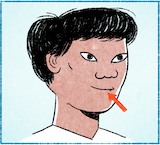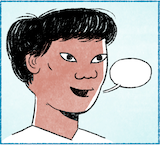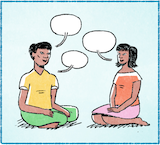



นี้คืออี่หยัง นี้คือคน เขาเป็นพุซาย
คือฮู้ว่าเขาเป็นพุซาย หน้าตาเขาคือพุซาย หน้าตาเขาบ่คือพุหญิงเลย เบิ่งจั่งใดกะฮู้ว่าเป็นพุซาย
มีลูกสอนสีแดงซี้ไปใส่ปากเขาแม่นบ่ แม่น ลูกสอนสีแดงซี้ไปใส่ปากของเขา
เขาเฮ็ดปากจั่งใด ตอนนี้เขาเม้มปากอยู่ เขาบ่ได้อ้าปาก
เขามีตาสองข้าง
เขามีดังพ้อม ดังของเขากะมีอันเดียว
เขามีหูพ้อม เขามีหูสองข้าง ข้างหนึ่งแนมเห็น อีกข้างหนึ่งแนมบ่เห็น เพาะว่าหน้ามันบังไว้
ผมของเขาสีอี่หยัง ผมของเขาสีดำ ผมบ่ญาวหลาย ผมสั้นๆ หนึ่ง
2
เขากำลังเฮ็ดหญัง เขากำลังเว้า จักเขาเว้ากับพุใด จักเขาเว้าอี่หยังอยู่ เห็นปากเขากำลังเว้าอยู่ กะเลยฮู้ว่าเขากำลังเว้าแท้ๆ
พุซายคนนี้เขาเถ้าไป่ จัก จักเถ้าหลือบ่เถ้า เบิ่งบ่ค่อยออก อาดสิบ่เถ้าหลาย อาดสิเป็นวัยทองอยู่ อาดสิบ่ทันได้เถ้ากะได้
3
เขากำลังเฮ็ดอี่หยังอยู่ เขากำลังเว้ากันอยู่
จักเขาเว้าอี่หยัง เขาเว้ากันอยู่สองคน
เขากำลังนั่งเว้ากัน มีพุหญิงกับพุซาย พุหญิงพุหนึ่ง พุซายพุหนึ่ง เขากำลังเว้ากัน จักเว้าอี่หยัง
เขาเว้ากันอยู่ใส จักคือกัน จักเขาเว้ากันอยู่ใส เห็นแต่เขานั่งเว้ากันอยู่ แต่บ่ลู้ว่าอยู่ใส
4
เขากำลังเฮ็ดอี่หยัง เขากำลังญ่างอยู่
เขากำลังญ่างกันไปสองคน มีพุหญิงกับพุซาย แล้วเขากำลังเว้ากันพ้อม
จักเขาเว้าอี่หยัง เขาญ่างไปพ้อม เว้ากันไปพ้อม
จักเว้าอี่หยังกัน มะโล่งโจ่งเจ่งอยู่ เทิงญ่างไป เทิงเว้าไป เทิงหันหน้าให้กันพ้อม คือสิม่วนหลาย
Link to overview page
Link to dictionary
| Isaan | Pronunciation | Tones | Thai | English/Notes |
|---|---|---|---|---|
| นี้ | ni: | HF | นี้ | 1. this 2. here |
| คือ | khʉ: | HR | คือ | 1. to be, to resemble, like, as 2. why {บักหล้าคือบ่เก็บโต่ะแน่ = [addressing a young boy] Why haven't you cleared the table?} |
| อี่หยัง | i:-yaŋ | H-M | อะไร | 1. what {นี้คืออี่หยัง = What is this?} {มื้อนี้เจ้าเฮ็ดอี่หยัง = What are you doing today?} {กินเข้างายกับอี่หยัง = What did you have for breakfast?} 2. something, anything, (in negations) nothing {บ่ต้องเฮ็ดอี่หยังอีกเลยนอกจากใส่ปุย = [we] don't need to do anything besides adding fertilizer} |
| คน | khon | HR | คน | person, people |
| เขา | khao | M | เขา | personal pronoun: he, she |
| เป็น | pen | M | เป็น | 1. to be, to exist 2. to be able to 3. to suffer, sth. happens to 4. เป็นหญัง[...]คือ in initial position: why? {เป็นหญังเขากะคือแปงฟัน = Why is he brushing his teeth?} {เป็นหญังเคี่ยงบินมันคือสิตก = Why is the airplane falling down?} |
| พุซาย | phu-sa:i | H-HR | ผู้ชาย | man, male |
| ฮู้ | hu: | HF | รู้ | 1. to know 2. to understand Notes: equivalent to ลู้ |
| ว่า | wa: | H | ว่า | 1. that, as {คำว่า X = the word X} 2. to say |
| หน้าตา | na:-ta: | LF-M | หน้าตา | face |
| บ่ | bɔ: | H | ไม่ | 1. no, not 2. question particle, transforming a statement into a question Notes: spelling exception in line with common usage on social media |
| พุหญิง | phu-ɲiŋ | H-M | ผู้หญิง | woman, female |
| เลย | lə:i | HR | เลย | 1. futher on, beyond, past {เข็มน้อยเลยเลขสิบสองไป = the minute hand has passed number twelve} 2. too much 3. at all 4. definitively 5. completely, utterly |
| เบิ่ง | bəŋ | H | ดู | 1. to look at, to see, to watch {เบิ่งโทละทัด = to watch TV} {เบิ่งหนัง = to watch a movie} 2. to guess {เบิ่งซงแล้ว ... = [I] guess / from what it looks like ...} |
| จั่งใด | jaŋ-dai | H-M | ยังไง, แบบไหน | how, in what manner {บักนาวมันมีลดซาดจั่งใด = Lime fruits have what kind of taste?} {เขาปิดแอจั่งใด = How is he switching off the A/C?} {เทียนใซ้จั่งใด = How's a candle used?} {สิใซ้จั่งใด = how is [it] used?} |
| กะ | ga | M | ก็ | 1. then, consequently 2. also |
| มี | mi: | HR | มี | 1. to have 2. there is |
| ลูกสอน | lu:k-sɔ:n | HF-M | ลูกศร | arrow |
| สี | si: | M | สี | 1. color 2. colored pencil, crayon |
| แดง | dɛ:ŋ | M | แดง | red |
| ซี้ | si: | HF | ชี้ | to point, to indicate, to show |
| ไป | pai | M | ไป | 1. to go 2. auxiliary indicating action extending into the future |
| ใส่ | sai | H | ใส่ | 1. to put something in/on {เขาใส่บักพิกในกวยเตียวหลาย = he's putting a lot of chili in his noodle soup} {เขาบีบยาสีฟันใส่แปงสีฟัน = he squeezes toothpaste on the toothbrush} {ก่องเอาไว้ใส่ของ = boxes are there to put stuff in} 2. to wear (clothes) {เขาใส่เสี้ยแขนญาว = he's wearing a long-sleeve} 3. directed at {เอิ้นใส่กัน = to call each other/to say to each other} {หมามันเห่าใส่แมว = the dog barks at the cat} {ล้องเพงใส่ไม = to sing into the microphone} {เขากำลังซี้มือไปใส่พุซาย = she's pointing at the man} |
| ปาก | pa:k | LF | ปาก | mouth |
| แม่นบ่ | mɛ:n-bɔ: | H-H | ใช่ไหม | question particle: ..., right? ..., isn't it? ..., don't you? etc. {เจ้าได้เห็นสิ่งนั้นแม่นบ่ = You've seen that, haven't you?} {ฝนกำลังตกแม่นบ่ = It's raining, isn't it?} {นี้คือกะคุแม่นบ่ = This is a bucket, isn't it?} |
| แม่น | mɛ:n | H | ใช่ | 1. yes 2. affirmative particle |
| ของ | khɔ:ŋ | M | ของ | of, belonging to |
| เฮ็ด | het | H | ทำ | to do, to make |
| ตอนนี้ | tɔ:n-ni: | M-HF | ตอนนี้ | now |
| เม้ม | mem | HF | เม้ม | to press one's lips together |
| อยู่ | yu: | H | อยู่ | 1. to be (located) at 2. yet, still 3. auxiliary indicating continuous or progressive action {ทอดปาอยู่ในกะทะ = (in the process of) frying a fish in the pan} {แม่กำลังเมี้ยนเฮียนอยู่ = mother is cleaning/tidying up the house} |
| ได้ | dai | HF | ได้ | 1. can 2. to get, to obtain 3. before verb: indicating past tense 4. บ่ได้ + verb: not |
| อ้า | a: | HF | อ้า | mouth, door, window: to open, to stand open {อ้าปาก = to open the mouth, to have the mouth open} |
| ตา | ta: | M | ตา | eye {เขามีตาสองข้าง = he's got two eyes} {หลับตา = to close one's eyes} |
| สอง | sɔ:ŋ | M | สอง | two |
| ข้าง | kha:ŋ | LF | ข้าง | 1. side {มีหูจับสองข้าง = there are handles on both sides} 2. next to {วางอยู่ข้างๆ ก่องใบใหญ่ = it's placed next to the large box} {เขายืนอยู่ข้างๆ อีกพุหนึ่ง = he's standing next to another person} 3. clf. for body parts which come in pairs (eyes, ears, legs etc.) {เขามีตาสองข้าง = she has two eyes} |
| ดัง | daŋ | M | จมูก | nose |
| พ้อม | phɔ:m | HF | พร้อม | at the same time, also, too {มีตะเว็นพ้อม = the sun's out, too} {กะทะมีด้ามพ้อม = the pan has also a handle} |
| อัน | an | M | อัน | 1. thing, object 2. general clf. for objects |
| เดียว | di:ao | M | เดียว | only, alone, single |
| หู | hu: | M | หู | 1. ear 2. opening, hole, e.g., the hole a needle has to insert the thread 3. handle which has a hole, e.g., of a cup or pot |
| หนึ่ง | nʉŋ | H | หนึ่ง | 1. one 2. after adjective: intensifier {บักคักหนึ่ง = very much} {อันบักใหญ่หนึ่ง = very large}, or attenuates the meaning {กะดาดมันแผ่นน้อยๆ หนึ่ง = the piece of paper is [relatively] small} |
| แนม | nɛ:m | HR | มอง | to look, to glance, to stare {เขากำลังยืนแนมก้อนหินอยู่ = he's standing and looking at the stone/rock} {ข้างหนึ่งแนมเห็น อีกข้างหนึ่งแนมบ่เห็น = [we] see one side, [we] can't/don't see the other side} |
| เห็น | hen | M | เห็น | to see |
| อีก | i:k | LF | อีก | 1. more, again 2. other, another |
| เพาะว่า | phɔ-wa: | H-H | เพราะว่า | because |
| หน้า | na: | LF | หน้า | 1. front {ปะตูหน้า = front door} 2. face {เขากำลังล้างหน้า = he's washing his face} 3. auxiliary: conditional tense {เขาหน้าสิเป็นพุบ่าวพุสาวกัน = they are probably groom and bride} {กะหน้าสิส้มอยู่ = it's likely to be sour} 4. season {หน้าฮ้อน = hot season} 5. page 6. clf. for pages {เฮาอ่านฮอดหน้านั้นแล้ว = we've read until this page} |
| มัน | man | HR | มัน | it (also used to refer to people) |
| บัง | baŋ | M | บัง | to conceal, to hide, to cover |
| ไว้ | wai | HF | ไว้ | 1. to keep, to put, to place, to retain, to save, to reserve {เขาเอาหัวของเขาไว้ใส = Where does she put her head?} {หมาสิเลี้ยงไว้บ้าน = dogs are kept/raised in the house} {ไก่เลี้ยงไว้ในคอก = chicken are kept/raised in a coop} {หน้ามันบังไว้ = the face is covered/not visible} {เขาเอาโทละสับวางไว้หู = he holds the phone to his ear} 2. for {นาลิกาปุกมีไว้เฮ็ดหญัง = What is an alarm clock for?} {หม้อเอาไว้เฮ็ดแนวกิน = a pot is used to make food} {ก่องเอาไว้เฮ็ดหญัง ก่องเอาไว้ใส่ของ = What is the box for? It's for putting in stuff.} Notes: see also ไว้ถ้า |
| ผม | phom | M | ผม | hair |
| ดำ | dam | M | ดำ | 1. black 2. to transplant rice seedlings {ดำนา = to transplant rice seedlings} |
| ญาว | ɲa:o | HR | ยาว | long |
| หลาย | la:i | M | เยอะ, มาก | many, much, very |
| สั้น | san | LF | สั้น | short |
| กำลัง | gam-laŋ | M-HR | กำลัง | auxiliary indicating continuous or progressive action |
| หญัง | ɲaŋ | M | อะไร, เป็นหญัง = ทำไม | 1. what {เขากำลังเฮ็ดหญัง = What is he doing?} {ธูปเอาไว้เฮ็ดหญัง = What are incense sticks for?} 2. something, anything, (nothing) 3. เป็นหญัง[...]คือ in initial position: why {เป็นหญังเขาคือใส่บักพิกลงไปในกวยเตียว = Why is he putting chili in [his] noodle soup?} {เป็นหญังหน้าต่างมันคือเปิด = Why is the window open?} {เป็นหญังมันคือมีควนไฟ = Why is there smoke?} |
| เว้า | wao | HF | พูด | to say, to speak, to talk |
| จัก | jak | M | จัก | 1. answer to a question: [I] don't know, don't know exactly, [I'm] not sure {พุซายคนนี้เขาเถ้าไป่ จัก จักเถ้าหลือบ่เถ้า เบิ่งบ่ค่อยออก = Is this man here already old? I don't know. I can't see clearly whether he's old or not.} {เขาเว้ากันอยู่ใส จักคือกัน = Where are they talking? I don't know either.} 2. exact(ly), what exactly {จักต้มอี่หยังกะบ่ฮู้ = I don't know what (exactly) he is cooking} {บ่ลู้คือกันจักปาอี่หยัง = I don't know either what kind of fish this is} 3. how much/many? {ต้นไม้มีจักต้น = How many trees are there?} {ตอนนี้จักโมงแล้ว = What time is it now?} {มือของเฮานี้สิมีจักนิ้ว = How many fingers do our hands have?} 4. a bit, a little bit {จักหน่อย/จักหน่อยหนึ่ง = a bit, a little bit} |
| กับ | gap | M | กับ | 1. and {ลุงกับป้า = uncle and aunt} {กวยเตียวหมูกับกวยเตียวไก่ = noodle soup with pork and noodle soup with chicken} 2. with, to {ค้ายๆ กับคำว่า ... = similar to the word ...} 3. prefix in front of foods {กับเข้า = side dishes eaten with rice} {เขากินกับกวยเตียว = he's eating noodle soup} |
| พุใด | phu-dai | H-M | ใคร | 1. who {มีพุใดโทมากะบ่ลู้ = I don't know who has called} {ห้องนอนของพุใด = whose bedroom (is this)? } 2. someone, somebody, anybody, in negative context: nobody {บ่มีพุใดอยู่กับเขาเลย = there's nobody with him} |
| แท้ | thɛ: | HF | แท้ | truly, surely, really, indeed |
| เถ้า | thao | LF | แก่, เฒ่า | age: old |
| ไป่ | pai | H | หรือยัง | question particle: yet {เขาข้ามสะพานไป่ = Has he crossed the bridge yet?} {เขากินเข้าแล้วไป่ = Has he finished eating yet?} {กินเข้าไป่? บ่ทันกิน = Have you eaten yet? Not yet.} |
| หลือ | lʉ: | M | หรือ | or |
| บ่ค่อย | bɔ:-khɔ:i | H-H | ไม่ค่อย | not so (much) {เบิ่งบ่ค่อยออก = I can't really see it clearly} |
| ออก | ɔ:k | LF | ออก | 1. to go out, to leave 2. out |
| อาด | a:t | LF | อาจ | 1. might, may, will 2. likely |
| สิ | si | M | จะ | future tense auxiliary {เขากำลังสิตื่น = he's about to wake up} {สิไปตะหลาด = [I'm] going to the market} |
| วัยทอง | wai-thɔ:ŋ | HR-HR | วัยทอง [?] | to be middle-aged Notes: seems to be describe a younger age than Thai วัยทอง = elderly |
| บ่ทันได้ | bɔ:-than-dai | H-HR-HF | ยังไม่ได้ | not, not yet {บ่ทันได้กินเข้า = [I] haven't eaten yet} {อายุบ่ทันได้หลาย = not yet old} {เขาอาดสิบ่ทันได้เถ้ากะได้ = maybe he's not yet (that) old} Notes: see also ทันได้ which is apparently equivalent |
| กัน | gan | M | กัน | mutual, each other, with another, together {เขากำลังนั่งเว้ากัน = they're sitting and talking} {เขาสองคนฮักกัน = they love each other} {ปาสองโตนี้ ใหญ่ห่างกันหลายบ่ = These two fish here, are they very different in size (from each other)?} {ต่างกัน = to be different (from each other)} {ก่องอันไหนหนักกว่ากัน = Which box is heavier (than the other(s))?} |
| นั่ง | naŋ | H | นั่ง | to sit |
| พุ | phu | H | ผู้ | 1. person 2. clf. for people {พุหญิงพุหนึ่ง พุซายพุหนึ่ง = a woman, a man} {ซู่พุซู่คน = everybody} {พุหนึ่งโตจ่อยๆ พุหนึ่งโตบักอ้วนหนึ่ง = one person is slim, the other is fat} Notes: pronunciation: also realized as พู่- |
| ใส | sai | M | (ที่)ไหน | 1. where? {สิไปใส = Where are [you] going?} {มาแต่ใส = Where are [you] coming from?} {กะทะอยู่ใส = Where's the pan?} 2. somewhere, anywhere {ใสกะได้ = anywhere, wherever you like} |
| คือกัน | khʉ:-gan | HR-M | เหมือนกัน | 1. also, likewise, similarly {ยินดีที่ได้ฮู้จักคือกันคับ = Nice to meet you too!} 2. in negative sentences: either {บ่ลู้คือกัน = I don't know either} {จักคือกัน = I don't know (either)} |
| แต่ | tɛ: | H | แต่ | 1. but {แต่บ่ต่างกันหลาย = but not very different} {แต่บ่ลู้ว่าเขาญ่างมาแต่ใส = but [I] don't know where he's coming from, see also: แต่ว่า} 2. only {ตอนนี้มีแต่ขี้ฝ้า = now there are only clouds} |
| ลู้ | lu: | HF | รู้ | 1. to know 2. to understand Notes: equivalent to ฮู้ |
| ญ่าง | ɲa:ŋ | H | เดิน | to walk {เขากำลังญ่างเว้ากัน = they are walking and talking} {ลูกเป็ดญ่างไปนำแม่เป็ด = the ducklings are [walking] following their mother} {เขากำลังญ่างข้ามสะพาน = she's walking over the bridge} {เขาสิญ่างไปใส = Where is he going?} |
| แล้ว | lɛ:o | HF | แล้ว | 1. finished 2. already 3. and then, and next (especially แล้วกะ) 4. auxiliary for past tense |
| มะโล่งโจ่งเจ่ง | ma-lo:ŋ-jo:ŋ-je:ŋ | H-H-H-H | ไม่ชัดเจน | in an unclear or confused manner Notes: translation to be further refined |
| เทิง | thə:ŋ | HR | ทั้ง | 1. up to, all, all of, the whole of, altogether {เขาใส่กางเกงขาสั้นเทิงสองคน = both are wearing short trousers} {เขาเป็นพ่อของลูกเทิงสามคนนี้ = he's the father of these three [children] here} 2. เทิง ... เทิง ...: both ... and ..., ... as well as ... {เทิงมีใบพ้อม เทิงมีเหลียนพ้อม = there are notes as well as coins} Notes: pronunciation: also realized as ทัง |
| หัน | han | M | หัน | to turn around/towards, to face |
| ให้ | hai | LF | ให้ | 1. to give {หมอกำลังเอายาให้คนป่วยกิน = the doctor is giving the patient medicine} 2. for 3. to allow, to be allowed |
| ม่วน | mu:an | H | สนุก, ม่วน | happy, amusing, fun |